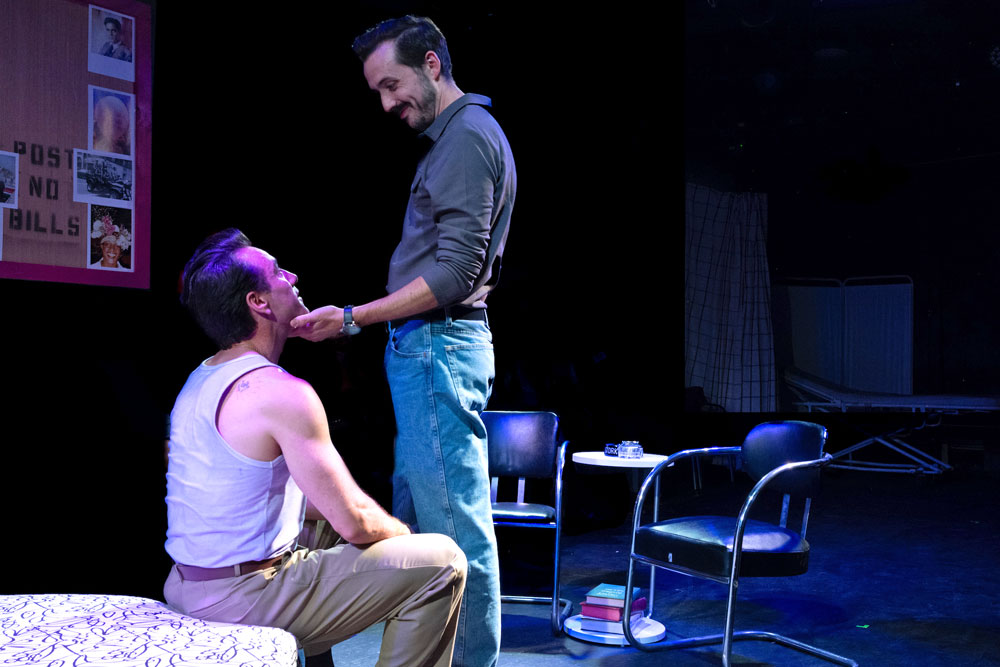Using plays as platforms to broadcast social manifestos is not new. The technique often serves to add clarity to the basis of the playwright’s arguments. Such a truth applies to Megastasis; a story about the crushing odds facing young black men now playing at the Athenaeum.

Playwright Kia Corthon has certainly done her homework and amassed enough facts supporting her position to fill an ocean. Many of those facts are joltingly horrific. She shares this information to prove that the legal system in the United States is pathologically rigged to suppress and contain the poor and the powerless.
The storyline is so familiar it could have been scooped from one of many newspaper human interest pieces focusing on the pathos of black existence on the south and west sides. In Megastasis, Corthon uses New York City as her geographical touchstone.
19-year-old Tray (Anthony Conway) exemplifies a spirit of hope and possibility when the audiences meets him. A new father, he’s passionate about remaining involved in his infant daughter’s life. Living with his recently widowed grandfather, he’s intent on forging a life that affirmatively embraces them all. He’s the quintessential good decent kid.
The twist comes in the form of one small mistake. Just a common misstep of youth that happens a second and then a third time. In today’s climate of mandatory minimums and at the mercy of a legal system that is all too often a draconian quagmire, accumulated errors in judgment, regardless of their insignificance, can have catastrophic consequences.
Tray begins to slip through the cracks when his lawyer convinces him to plead guilty to possession when cops nab him with a couple of joints in his pocket at a party. The plea should have garnered him 18 months. He instead gets three years. Accusations against him while he’s incarcerated end up costing his grandfather his home when the police initiate a civil forfeiture.
Thanks to his cousin Dubby (Gregory Fenner), Tray somehow fights back to a place of hope and aspiration throughout his Job like travails. His cousin doesn’t abandon him when new obstacles keep rising to stymie his progress. Played convincingly by Fenner, the genuineness of his character’s sincerity enlivened the play as well as the actor’s performance.
Darren Jones as Tray’s grandfather made huge contributions to the play’s palatability. He folded into his character with absolute comfort; projecting wisdom, compassion and resolve.
Christian Castro as Reiger, Tray’s lawyer, added theatrical gravitas to the production as well.
The not so enviable task of playing the Cassandra who chronicles doom and despair fell to Ashley Hicks as Gina. As a precocious pre-law student who wants to use her degree to right the world, she was like a volcano spewing moral outrage after moral outrage and heaping them all at the feet of our failed political and legal systems. Hicks nevertheless acquitted herself well in the role and may have even excelled had she maintained a stronger grasp of her lines.
Intractable problems are as much a part of the human condition as birth and death. They exist and it is our collective duty to solve them. If the playwright sees it as his or her obligation to sound the clarion horn about forces that are decimating communities, then it is also incumbent on them to outline specific and realistic options for redress. Otherwise, they are simply lecturing their audience.
Eclipse Theatre Company
Athenaeum Theatre
2936 N. Southport Ave.
July 13 – August 20, 2017
773-935-6875 (Athenaeum Box Office)
www.eclipsetheatre.com

![PrideArts [title of show] Raining Gold](https://rowgseat1.com/wp-content/uploads/2024/09/a53939222075_ceaf585bae_k.jpg)
